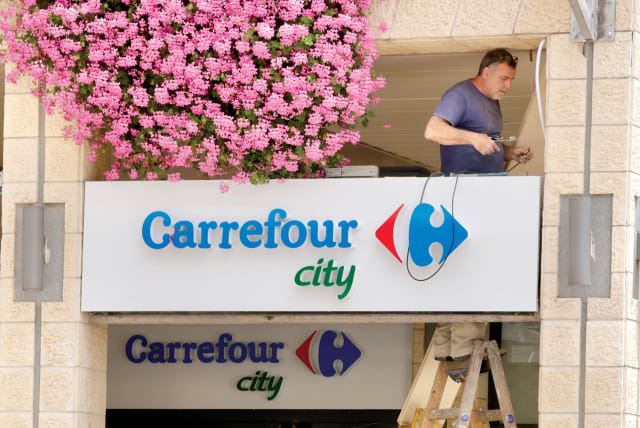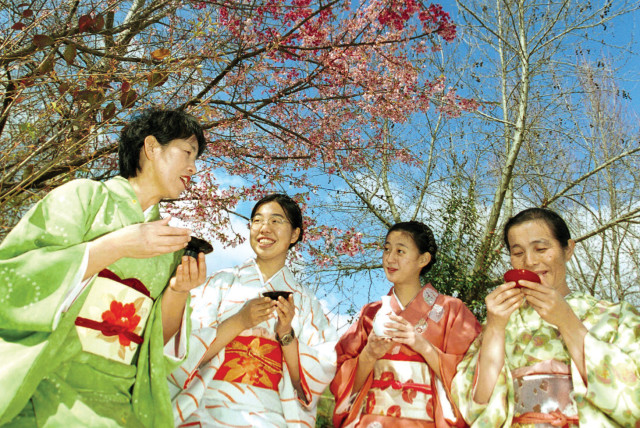This week in Jerusalem: French style

A weekly round-up of city affairs
French style
The international French retail chain Carrefour is opening a branch in Beit Hakerem, one of 50 branches to open in the country. The chain promises products of European quality at the lowest prices on the market. The branches will offer more than 1,000 Carrefour products in 80 categories, including food products, organic products, tea infusions, coffee capsules, toiletries, and cleaning products.
Whose victory is it?
It was supposed to be a moment of sweet victory for the activists in Kiryat Hayovel, and especially for Deputy Mayor Yossi Havilio. After the municipality obtained the area of Beit Taylor from the hands of the Shikun & Binui company, Havilio and the activists expected to hear that the site would begin to serve as a cultural hub for pluralistic residents. However, at the last moment, Eliezer Rauchberger, head of the United Torah Judaism faction and chairman of the Local Planning and Building Committee, introduced an amendment that may actually benefit the neighborhood’s haredi residents.
Mayor Moshe Lion managed to transfer the land to municipal ownership and thus annul plans to build build a residential project on the site. However, Rauchberger added the conditions that new schools will be set up in the complex according to need and according to the existing and future shortages, whereas in Havilio’s view, the plot was planned to be used for culture and entertainment for the pluralistic residents.
Still against that road
Jerusalemites continued their fight against the construction of the Berech Road. On Friday, May 5, residents of Katamon, Talpiot, Baka, Beit Safafa, and the surrounding area protested at Safra Square against the municipality’s decision to proceed with the project – a four-lane freeway planned next to the Blue Line of the light rail near Ha’uman Street – saying, “Yes to Hamesila Park, no to the Berech Road.”
After the demonstration, participants initiated an operation to distribute flyers and hang signs on the fences of the project. Later, Yossi Saidov, chairman of the Gonen local council administration, thanked all the activists who led and promoted the demonstration, as well as Adir Schwarz, city council member and chairman of Hitorerut, for participating in and supporting the struggle in the demonstration and at the city council meetings.
Saidov stated that former transportation minister Merav Michaeli decided to freeze the construction of the road adjacent to Hamesila Park near the Rami Levy supermarket on Ha’uman Street in Talpiot, a decision canceled by current Transportation Minister Miri Regev, adding that the Jerusalem Municipality is expected not to harm the most successful project built in Jerusalem in the last decade.
Saidov is also opposed to the plan to build a bridge hundreds of meters long which, according to him, is a bad solution that will only exacerbate the damage to the park.
Safra Square believes that the two axes planned – on Pierre Koenig Street, which is to be the main boulevard of the renewed neighborhood; and the road that connects the neighborhood to Pat Junction – are the right option.
Oneg Shabbat
Is another Shabbat war looming? In the tender for the operation of a coffee shop in the Talbiyeh Rose Garden, the clause stating that “the tenant undertakes not to operate the business on holidays and on Saturdays” is contrary to the status quo (which allows leisure and recreation but not commerce on Shabbat) and the municipal bylaw, according to Hitorerut, the opposition party on the city council. Hitorerut maintains that this is not a religious neighborhood, as Talbiyeh is located in the heart of a liberal area of the city, thus the municipality’s clause in the tender amounts to religious coercion.
In the past, in tenders for operating coffee shops in Independence Park and Sacher Park, Hitorerut representatives made sure to maintain the status quo and allow the operators to choose whether to operate on Shabbat or not, without the intervention of the municipality. If the municipality dictates in advance that the franchises are not permitted to operate the cafe on Shabbat, this is coercion, concluded the opponents.
Botanical pavilion
In a joint initiative of the Jerusalem Botanical Gardens (Givat Ram), the Jerusalem Foundation, and the Jerusalem Municipality, the construction of the Marcus Margulies Pavilion began this month. The new entrance pavilion will give visitors to the Botanical Gardens a unique experience and is expected to attract visitors from all over the country and beyond.
The building complex, totaling approximately 400 square meters and reaching a height of about 16 meters, will consist of a series of domes connected to each other and will serve as an additional and accessible entrance to the gardens.
Visitors will enjoy a visual display that combines colors, rare plants, water and light, intended to open a window into the world of botany and its importance to humankind.
Marcus Margulies, born in London, has contributed over the years to many projects throughout the city.
The Margulies Pavilion, designed by Shlomo Aronson Architects, will present to the public botanical content suitable for all ages. It will serve as a living museum and visitor center designed to bring the world of plants to life through interactive exhibits such as a display house for subtropical plants, and an outdoor classroom in the form of a large pergola, as well as a gift shop and a café.
The exhibition spaces in the pavilion will be able to accommodate up to 150 people. The pavilion will include a stop for the small train that takes visitors on tours around the gardens.
The Jerusalem Botanical Gardens operates as an educational, horticultural and research center with a diverse collection of plants from all over the world displayed geographically, as well as a center for recreation, tourism and cultural and artistic events, education, training and research. It is the largest botanical garden in Israel, and it has the largest collection of living plants in Israel and the Middle East. More than 7,000 species and varieties of plants from around the world grow in the garden, displayed in six geographical sections –South Africa, Europe, North America, Australia, Southwest and Central Asia and the Mediterranean. ❖
Jerusalem Post Store
`; document.getElementById("linkPremium").innerHTML = cont; var divWithLink = document.getElementById("premium-link"); if (divWithLink !== null && divWithLink !== 'undefined') { divWithLink.style.border = "solid 1px #cb0f3e"; divWithLink.style.textAlign = "center"; divWithLink.style.marginBottom = "15px"; divWithLink.style.marginTop = "15px"; divWithLink.style.width = "100%"; divWithLink.style.backgroundColor = "#122952"; divWithLink.style.color = "#ffffff"; divWithLink.style.lineHeight = "1.5"; } } (function (v, i) { });

